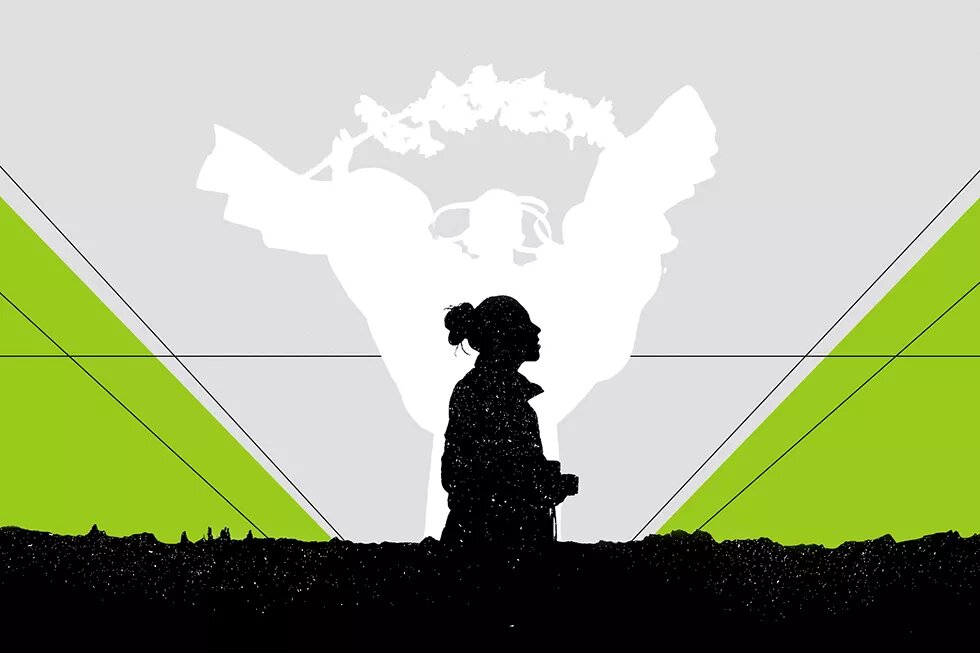The precondition for a real and sustainable recovery of Ukraine is, above all, the victory over the Russian aggression against the country. Still, the discussion on the vision and specific steps for reconstruction cannot wait as residents of damaged towns and millions of internally displaced persons need viable living conditions already now, while the war is still ongoing. Ukrainian society needs to build up resilience in many aspects. This interview presents a feminist perspective on the priorities of reconstruction and the importance of international support and allyship among communities. An interview with Galyna Kotliuk, Programme Coordinator - Gender Democracy/Women Rights/LGBT-Rights at the Heinrich-Böll-Stiftung Kyiv office.

What are the main challenges related to reconstruction from the feminist point of view?
2.4 million people have lost their homes due to the Russian war in Ukraine. Therefore, providing housing for the IDPs and refugees (the majority of them being women) coming back from the EU and other countries will be one of the most important challenges we will face. If we are talking about rebuilding of the damaged houses or building new ones, it would be very important to take into account the gender sensitive approach, which would ensure that the needs of women with children, LGBTQ+ community, people with disabilities, and the elderly are taken into account.
Moreover, it is extremely important to rebuild social infrastructure facilities — kindergartens, schools, hospitals, and senior care homes, which have been destroyed by the Russian army. We need to be aware that without this infrastructure the load of the unpaid labor (conducted mostly by women) will grow and that will increase the workload for women. Therefore, it is very important to make sure that social infrastructure is restored to serve the needs of women in their communities.
Also, we will need to address the needs of survivors of gender-based violence (the majority of them are females, although we know about cases when males and boys have also experienced GBV).
This means opening help centers where these people can find support — medical, legal and psychological – as well as helping them to integrate back into society. All of this requires both equipped spaces and trained professionals. Help centers like this need to employ knowledge and perspective of LGBTQ+ people in order to respond to the challenges of the post-war reconstruction and to best address the needs of forcibly displaced people who are LGBTQ+ and gender-diverse. Only this way can we be sure that we are integrating inclusive and non-discriminatory approaches in order to help the survivors of GBV.
Do you think that the role of women in the Ukrainian society and the situation of LGBTQ+ persons will change after the war and if so, in what way? Can you see more challenges or more opportunities here?
This is indeed a very complex question and it is difficult to give a definite and final answer to it. We see now how actively Ukrainian women and the LGBTQ+ community are contributing to Ukraine’s victory over Russian military aggression: both women and LGBTQ+ community representatives have joined the armed forces to defend Ukraine. With 56 000 women serving in the army, the Ukrainian military has one of the highest numbers of women in the army among NATO member states. Many women (including those representing various feminist NGOs) and LGBTQ+ persons are very active as volunteers, who support Ukrainian armed forces.
Women’s involvement both into the military and volunteering movement has been recognized at the state level.
My personal hope is that after Ukraine’s victory this recognition will not remain a matter of the past and that women’s contribution will be acknowledged not only at the discourse level (although it is very important), but also at the decision-making level, and we will see more women holding positions both in Ukrainian government and parliament as well as introduction of reforms that will transform Ukrainian army into a place where women can pursue their careers in the after-war times.
On the other hand, a great percentage of Ukraine’s care infrastructure is destroyed and its rebuilding requires not only financial investment but also time. Until this infrastructure is rebuilt, women will have to take care of children and the elderly in their families, which can only reinforce patriarchal gender roles distribution. Therefore, it is very important to include the gender-sensitive approach in Ukraine’s after-war recovery to ensure that there will be no backlash to traditional gender roles distribution.
The overall attitude of Ukrainians towards the LGBTQ+ community has also witnessed some major positive changes: in the last six years (2016-2022), the number of Ukrainians who have a negative attitude towards LGBTQ+ people decreased 1.5 times (from 60.4% to 38.2%), the number of those who have a positive attitude quadrupled (from 3.3 % to 12.8%), and of those who are indifferent — increased from 30.7% to 44.8%.
On July 8, 2022, a petition on the legalization of same-sex marriages reached 25.000 signatures. With the start of the full-scale invasion of Ukraine, many LGBTQ+ people went to the front-lines to defend their country from the Russian occupiers. However, according to the current Ukrainian legislation, LGBTQ+ families are now more vulnerable than ever — they cannot officially get married, get children’s custody, inherit their partner’s assets, and are even denied the right to bury their partner’s body. Although the President had replied to the petition with an alternative solution of the legalization of same-sex civil partnerships, we have not seen any changes to Ukrainian legislation as of now. I see the role of Ukrainian civil society in further monitoring of the situation and advocacy of same-sex civil partnerships. We all should work to make sure that all Ukrainian citizens regardless of their gender, sexual orientation, ethnicity, or religion can enjoy the same rights and freedoms — this is what constitutes the main difference between Ukraine and the aggressor state.
Reconstruction will be a challenge facing mainly Ukrainian society. However, international support also plays an essential role. From a feminist perspective, what kind of support is most needed?
First of all, financial support. According to the World Bank, the total reconstruction and recovery needs are estimated at about US$349 billion as of June 2022, therefore the actual number can be higher. Ukraine firstly presented the Recovery Plan of Ukraine during the Ukraine Recovery Conference in Lugano. However, this plan lacks the gender-sensitive approach to Ukraine’s after-war recovery. Therefore, it will be absolutely important to both convince the government to include this component into the recovery plan and to support local initiatives and NGOs that can provide necessary expertise and knowledge.
Then, support of the experts, who could share their best practices in dealing with various issues (e.g., rehabilitation of GBV survivors) with Ukrainian civil society organizations. This could be done in the format of exchanges or trainings.
Third, informational support. The full-scale war in Ukraine has been going on for almost a year. Our partner countries and allies are getting used to it. This is wrong — war is not a normal situation, which reflects the state of being of a society. Therefore, it is important to constantly remind people in the EU about the war, talk to them, and explain why it is important to support Ukraine.
Networks and communities advocating for the same values can and should be part of the international support too. Even though the feminist community as such is very diverse and complex, what is your general impression: Do feminists in Ukraine feel sufficiently perceived and supported by the international community?
Overall, yes, and this is very heartwarming to feel the support of the community. However, we still sometimes hear pacifist calls, which do not bring anything productive to the table. Again, Ukrainian feminists want peace, but negotiating with Russia at this point is senseless — it would only postpone the war, not end it.
Also, we see the desire of our Western peers to put Ukrainian, Russian, and Belarusian feminists into the same space, facilitating discussions and making us “be friends again.”
This creates an artificial space with all three “brother nations” being together, and distracts from reality. The Ukrainian feminist community doesn’t see that as a productive means of fighting the war either. We don’t deny the need to communicate in the future; however, forcing us to be a part of such groups before Ukraine wins the war, Russia pays reparations, and all the criminals are prosecuted in the Hague is not helping Ukraine win.
What is lacking?
Firstly, what is needed is an anticolonial approach to re-thinking historical, cultural, and political relations between Russia (as an empire) and its colonies, with Ukraine being one of them. I still see that many Western intellectuals fail to recognize Russia as an empire and Ukraine as a victim of Russian colonial ambition. Therefore, this would be a vital first step in knowledge production based on an anti-colonial approach and thinking. It should be integrated at all levels of discourse, including academic and public ones.
Secondly, we need international cooperation and projects. I wish there would be more international cooperation between feminist communities and more international visibility of Ukrainian feminists. At the beginning of December, the Gunda-Werner-Institut organized and conducted an Instagram livestreaming with two Ukrainian experts who were talking about GBV in Ukraine (I helped to facilitate this event). I think it is vital that we have more of such international events, where Ukrainian experts could talk about Ukraine and the current situation.
What role could the feminist communities in various countries play in reconstruction? What kind of support, what kind of civil society project formats are necessary?
Big international feminist organizations can act as donors in Ukraine. Also, they can share their practice of evaluation, monitoring, and supervision of different projects and policies to ensure their productivity and success in Ukraine.
In addition, partners can engage in best practice exchanges. I think it is very important to ensure and facilitate knowledge and exchange of experience between Ukrainian and European feminist experts. Close international cooperation will be a valuable contribution for a sustainable and gender sensitive recovery of the country. As a very specific example, I would mention that we need experts who could share their knowledge and expertise in fighting the consequences of GBV and helping its survivors to overcome this experience and get reintegrated into society.
Furthermore, we need to shape the discourse and organize more discussions, publication opportunities, workshops, seminars, and conferences, where Ukrainian voices will be present. This includes both academic and public discourses. It is very important that Ukrainian experts are present and visible in the Western academic and media spaces, and that their voices are heard. Feminist communities could create platforms that would ensure this intellectual exchange and Ukrainian presence in the discussions concerning Ukraine.
What do you expect from international feminists networks?
Ukrainian NGOs have been excluded from international networks for a long time — Russian NGOs on the other hand have always had more opportunities to enjoy connections with such networks. It is vital that Ukrainian NGOs are included in these networks — this will facilitate knowledge and experience exchanges, as well as ensure Ukrainian civil society integration into the European space.
In October, the Heinrich Böll Foundation hosted the annual conference of Kyiv Dialogue. One of the main conclusions was that there is a lack of competence on Ukraine in Germany. At the same time, Ukrainian Civil Society groups published an open letter with the following demand: “Stop trying to build our ‘capacity’ (…) International NGOs often need to build their own organisational capacity and knowledge about our context.”
What would be your recommendation on how to build competence on gender related issues and feminist discourses in Ukraine? What are the best sources of information to follow?
Since the full-scale invasion, Ukrainian feminists and researchers have been granted access to the resources of Western academia. This is a good sign, but we have to make sure this access will not be ended after the war — it can and should become a foundation of the future cooperation between Ukrainian and European feminist communities.
On the other hand, we see an unprecedented level of interest towards Ukraine from the side of Western colleagues. There is a problem with knowledge production — the majority of materials about Ukraine in the West are produced by Western scholars, which influences the perspective in which Ukraine and Ukrainian feminist community are seen. English materials about Ukraine written by Ukrainian experts are lacking — most of them are produced exclusively in Ukrainian. Now we see an increasing demand for English materials from our Western colleagues, however, given the circumstances it is very difficult to produce such translation now. Our project at HBS “Gender in Detail” tried to translate some chosen articles into English which was very welcomed by both Ukrainian scholars in the West and our Western colleagues. However, I do realize this is only a drop in the ocean. Next year, we are planning to translate more materials and upload them to our website.
Gender in Detail is also on social media, Twitter and LinkedIn are being developed in English.
This article was first published on ua.boell.org.


